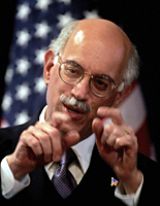U.S. envoy for Sudan feels weight of his job
Sept 22, 2006 (NEW YORK) — As the U.S. president’s new special envoy for Sudan, Andrew Natsios is acutely aware that millions are counting on him to end the crisis in Darfur but he is under no illusion how hard that will be.
 The former head of U.S. aid programs and now a professor at Georgetown University, Natsios is no stranger to Sudan and first went there nearly two decades ago to get in food aid.
The former head of U.S. aid programs and now a professor at Georgetown University, Natsios is no stranger to Sudan and first went there nearly two decades ago to get in food aid.
“None of these names are new. I negotiated a deal with (Sudanese President Omar Hassan al-) Bashir at that time because there was a war in Darfur then. We made an agreement. They didn’t carry it out,” Natsios said in an interview with Reuters.
President George W. Bush’s appointment of a special envoy follows months of pressure from religious, political and human rights groups on all sides as well as Congress. Millions have rallied for the appointment, accusing the Bush administration of not doing enough to end the crisis.
“I am aware that there are very strong feelings on this and that people are expecting miracles that I cannot perform,” acknowledged Natsios.
Darfur has suffered several wars since the late 1980s but Natsios says this one is the bloodiest, at least in part because of the Khartoum government’s unrelenting stance toward the violence.
More than 200,000 people have been killed in Darfur in the past three years and 2.5 million forced from their homes in what Washington calls the first genocide of this century.
‘AGRESSIVE DIPLOMACY’
Natsios, who was with Secretary of State Colin Powell when he visited Sudan in 2004, said his first task would be to assess the current U.S. approach to Darfur and work out how to push forward.
“Our first priority has to be to protect those people. We are seeing a huge (Sudanese government) military offensive going on right now,” said Natsios.
He plans “aggressive diplomacy” to enlist the help of Arab nations, which the United States believes have not done enough to stop the violence or convince Khartoum to drop its refusal accept a U.N. force to take over from struggling African Union soldiers in Darfur.
The United Nations passed a resolution last month to send 20,000 peacekeepers to Darfur where about 7,000 AU troops have been battling to keep the peace in an area the size of France.
Natsios said the Sudanese government’s refusal to accept a U.N. force had nothing to do with its objections that such a mission would amount to “colonialism” but more to do with fears that those responsible for the genocide would be charged with war crimes.
Natsios’ said his strategy will be to include some “carrots” in his dealings with Bashir, including promises of reconstruction. “We need to find things that they perceive to be in their interests,” he said, without elaborating.
As head of the U.S. Agency of International Development until he resigned last December, Natsios was in charge of reconstruction programs in Iraq and Afghanistan and he hopes Darfur will benefit from massive rebuilding efforts.
During his past visits to Sudan he developed an affection for the Sudanese people, which was why he wanted to return to government service after his stint at Georgetown University.
“All these atrocities is not what Sudan is about. It is very sad to me to see the suffering and that is why I came back to do this job,” he said.
(Reuters)
